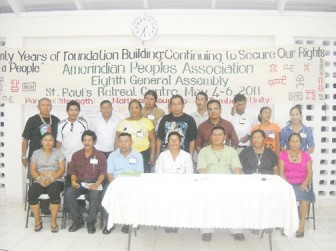The Amerindian Peoples Association (APA) last evening elected a new executive committee and vowed to pursue land rights concerns and insist on adequate consultations on carbon initiatives.
It charged that none of the 66 communities present at two days of deliberations felt that consultations by the government with them on the Low Carbon Development Strategy (LCDS) and Reduced Emissions from Deforestation and Forest Degradation (REDD+) were adequate.
The APA’s 8th General Assembly met at the St Paul’s Retreat Centre at Better Hope on the East Coast of Demerara to discuss a range of issues, following which the new committee, which over the next three years will be headed by Sharon Atkinson of the Moruca sub-region in Region One, was elected. The new body comprises 20 persons, who reside in indigenous communities throughout the country.
Issues which were discussed over the two-day period included problems experienced by communities regarding the recognition of land and territorial rights, the lack of adequate consultation on key decisions which affect the nation’s first peoples, as well as logging and mining issues.
Atkinson noted that the body also discussed ideas for overcoming the challenges as well as the association’s vision for building a stronger and more sustainable nation, with respect for human rights and the environment playing a critical role.
The land rights issues took centre stage throughout the meeting. Atkinson noted that the issue had been on the front burner for sometime as many communities which are affected by mining and logging operators being granted rights to titled lands have been given little satisfaction by the administration.

She said that the newly installed body is hoping to engage the relevant government bodies such as the Guyana Geology and Mines Commission (GGMC), the Guyana Forestry Commission (GFC) as well as the Ministry of Amerindian Affairs on the issue. Among the resolutions made at the forum were that there be adequate and fair consultation with the indigenous community on the LCDS and initiatives for REDD+. According to the APA, the aforementioned projects should not proceed when there are unresolved land issues.
The conference noted that none of the 66 communities represented at the meeting considered their communities to have been adequately consulted on the LCDS and REDD+ and the APA called on the administration to conduct a consultation process with the Amerindian communities on the environmental initiatives.
It was also noted by the APA that the relevant government agencies must revoke all mining and forestry licences granted to operators to work on traditional lands claimed by communities unless they are approved by the community.
The APA noted that each community should be free to determine who can and cannot be granted rights to exploit indigenous lands and resources, as well as establish community based regulations.
In addition to Atkinson, others who were elected to serve on the executive of the APA are Tony James, Vice-President; Ron James, Secretary; and Earl Thomas, Treasurer.




